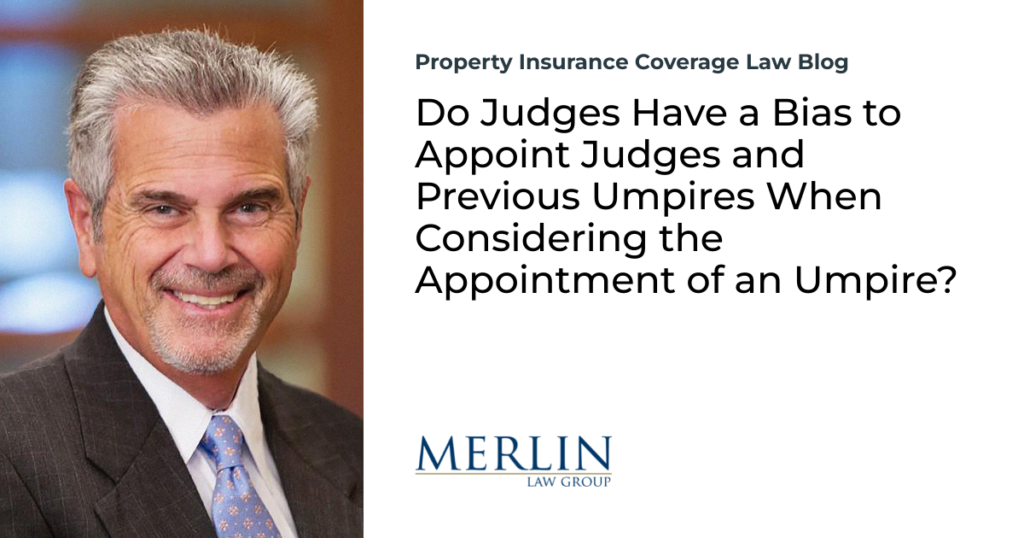Do Judges Have a Bias to Appoint Judges and Previous Umpires When Considering the Appointment of an Umpire?

In the post, “How Do Judges Appoint Umpires in an Appraisal? A Case Example from Louisiana,” who did the judge appoint? I noted that:
In this case, the judge appointed an umpire who had been appointed before as an umpire and as a special master on a number of other cases. My assumption is that the judge believed that Cade was considered fair based on those qualifications.
In a decision filed last week,1 I noted that the court seemed to be concerned with evidence proving that a candidate had prior experience as an umpire. In this Kentucky case, the court noted the following:
HUB presented one non-local candidate, Brian Goodman, an attorney and general counsel for the National Association of Public Insurance Adjusters (‘NAPIA’), and expert witness in the field of Public Adjusting, Insurance Carrier Adjusting, and Independent Adjusting in Pennsylvania, Texas, and Maryland. Owners objects to Mr. Goodman because he primarily works for insureds and has strong ties to the public adjuster industry. HUB counters that Mr. Goodman has represented policy holders and insurance companies but provides no citation. HUB also argues Mr. Goodman is the only candidate that has served as an umpire, but again provides no support for this statement. While Mr. Goodman’s work experience primarily for insureds does not automatically disqualifies him, there is not support in the record for his experience as an umpire.
As to competence, HUB argues that Owners’ proposed umpires have no experience serving as an umpire, or experience with first party property insurance. This is also true of HUB’s local candidates as none of them appear to have experience with first party property insurance or serving as umpires. No evidence shows that any of the proposed candidates have experience serving as an umpire. The only candidates that appear to have experience with first party property insurance are Mr. Goodman, proposed by HUB, and Hon. Lyles, proposed by Owners.
The court then selected JAMS judge Ellen Hobbs Lyle:
The Court has examined the credentials of all of the candidates, as well as all of the objections, and finds that the Owners’ candidate, Hon. Ellen Hobbs Lyle, is the best candidate to appoint as umpire based on her experience a mediator, arbitrator, judge, and with construction and insurance disputes…. Owners has provided substantial support in the record for her appointment as umpire. Ms. Lyle has also presided over first party insurance disputes and cases appointing umpires in insurance disputes, and this experience differentiates her from the other candidates in a way that will assist this insurance dispute.
In the referenced case, the court placed significant emphasis on the candidate’s experience as an umpire in an appraisal process. This highlights a crucial lesson for those aspiring to be appointed as umpires: the importance of meticulously documenting your umpiring experience in your resume. It is not only beneficial to list your experiences as an umpire but also to specify whether any of your appointments were made by a court. This detail adds a layer of credibility and demonstrates your acceptance and recognition in legal and professional circles.
Additionally, I would recommend pursuing training and obtaining certification as an umpire. Engaging in formal training programs and earning certifications can substantially enhance your qualifications. It equips you with the necessary skills and knowledge to perform effectively in the role of an umpire. Furthermore, certifications serve as a formal acknowledgment of your expertise and commitment to the field, which can be a decisive factor in being chosen for the role.
In essence, for those aiming to be appointed as umpires, it is essential to clearly document your experience, highlighting any court appointments, and augment your qualifications through targeted training and certification. These steps will not only improve your skills but also enhance your professional profile, making you a more attractive candidate for umpire roles.
Selecting a trustworthy individual to make crucial decisions in property insurance disputes is a challenging task. This is particularly true when the decisions to be made are significant, and the parties involved hold differing opinions. In such scenarios, the role of an umpire becomes pivotal. They must not only be impartial but also possess the ability to discern and weigh evidence fairly. Experience in the subject matter certainly helps immensely after the individual’s trustworthiness is determined.
Former judges often emerge as strong candidates for this role. Their professional careers are built upon the principles of fairness and justice, and they are trained to make decisions based on the evidence presented before them. Their experience in the legal system equips them with the skills necessary to navigate complex situations and make balanced judgments. But, they often lack the up to date experience in the subject matter.
Another group of individuals who can be considered for this role are those who have previously been selected as umpires by policyholder and insurer appraisers. Their prior selection indicates that they have been recognized for their impartiality and fairness. This history of being chosen for such roles serves as a testament to their ability to handle disputes effectively. It seemed obvious to me that in the last two decisions about umpire selection analyzed on this blog, the judges were looking for such evidence of prior umpire experience.
Who would you trust, other than yourself to make these most important decisions? How would you go about doing so? What criteria do you think would be important? If you are in the business of being an umpire or participating in the selection of an umpire, these are important questions that should be evidenced in the resume of a proposed umpire.
Thought For The Day
Trust is the glue of life. It’s the most essential ingredient in effective communication. It’s the foundational principle that holds all relationships.
—Stephen R. Covey
1 Owners Ins. Co. v. HUB Multifamily, No. 1:23-cv-0060, 2023 WL 8263426 (W.D. Ky. Nov. 29, 2023).







